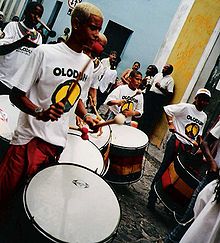This is an old revision of this page, as edited by Mrceleb2007 (talk | contribs) at 12:13, 21 March 2020. The present address (URL) is a permanent link to this revision, which may differ significantly from the current revision.
Revision as of 12:13, 21 March 2020 by Mrceleb2007 (talk | contribs)(diff) ← Previous revision | Latest revision (diff) | Newer revision → (diff)This article has multiple issues. Please help improve it or discuss these issues on the talk page. (Learn how and when to remove these messages)
|

Olodum is a bloco-afro from Salvador's carnival, in Bahia, Brazil. It was founded by the percussionist Neguinho do Samba.
Olodum develops activism to combat social discrimination, boost the self-esteem and pride of Afro-Brazilians, and defend and fight to secure civil and human rights for marginalized people in Bahia and Brazil. Currently, it has a social project called Escola Olodum (Olodum School).
Banda Olodum (Olodum's Band)
Olodum is widely credited with developing the music style known as samba reggae and for its active participation in carnaval each year. Neguinho do Samba, the lead percussionist, created a mix of the traditional Brazilian samba beat with merengue, salsa, and reggae rhythms for the Carnaval of 1986. This became known as samba reggae. This "bloco afro" music is closely tied to its African roots, as seen through its percussion instruments, participatory dancing and unique rhythm. It also directly draws from many Caribbean cultures, like Cuba and Puerto Rico. Olodum's performing band (or Banda) has released records in its own right and has been featured on recordings by Brazilian stars such as Simone and Daniela Mercury.
Just after, Olodum started to be known in the entire world as an African-Brazilian percussive group and performed in Europe, Japan, and almost all of South America. In 1988, Simone recorded “Me ama mô” live, in Pelourinho, featuring Neguinho do Samba and Olodum (this record is in Simone’s album, "Simone"). In 1991, Olodum performed at Paul Simon's Concert in the Park after they had worked on Simons 1990 album The Rhythm of the Saints.
One of the biggest moments for the group was in 1996, when they participated in the Michael Jackson song "They Don't Care About Us" from his ninth studio album HIStory: Past, Present and Future, Book I, and the first video clip was recorded in Pelourinho and Jackson also collaborated with the 200 members of the cultural group Olodum, who played music in the video. The media interest surrounding the music video exposed Olodum to 140 countries around the world. It brought them worldwide fame and increased their credibility in Brazil. Lúcia Nagib, of The New Brazilian Cinema, said of the music video:. After this, Olodum recorded with famous artists from Brazil and abroad, such as Wayne Shorter, Jimmy Cliff, Herbie Hancock, and Caetano Veloso. In 1996, the band appeared in heavy metal band Sepultura's album Roots. In 2013, the band played live with Kimbra on Rock in Rio's sunset stage, performing a cover of "They Don't Care About Us". Beyond that, they participated in the official song, consequently in the opening, of the FIFA World Cup 2014, with rapper Pitbull and singers Jennifer Lopez and Claudia Leitte. Parallel to the artistic success, the band takes part in social movements against racism and for civil and human rights.
On June 13, 2011, Olodum's ex-vocalist and songwriter Germano Meneghel, author of hits like "Avisa lá," "Vem, Meu Amor," "Alegria Geral," and the posthumous "Várias Queixas," was found dead in his home. The causes of death are still unknown.
Annually, since 1980, in Salvador's Carnival, Olodum innovates with the most related topics to the importance of African culture to the construction of society, as in the 2014 carnival theme, "Ashanti - The Golden Throne and the Queen Yaa Asantewaa." And the theme song is chosen in a songwriter competition called FEMADUM (in English, Olodum's Music and Arts Festival). Below are all the themes and their years already addressed by Olodum:
Neguinho do Samba died of heart failure on October 31, 2009, at the age of 54. Olodum's singer and songwriter, Germano Meneghel, died in June 2011.
Discography
Studio Albums
- 1987, Egito Madagáscar
- 1989, Olodum 10 Anos
- 1990, Da Atlântida à Bahia
- 1993, Movimento
- 1994, Menino Dourado
- 1995, Filhos do Sol
- 1997, Da Alta à Bahia
- 1997, Liberdade
- 1999, Popularidade
- 2002, Olodum Pela Vida
- 2005, Roma Negra
- 2005, Pela Vida
Live albums
- 1997, Live at the Montreux Jazz Festival
- 2005, 25 Anos de Samba Reggae: Ao Vivo
Collections
- 1994, 10 Anos - Do Deserto do Saara ao Nordeste Brasileiro
- 2000, A Música do Olodum - 20 Anos
- 2008, Nova Série - Olodum
References
- ^ "Morre Neguinho do Samba, fundador do Olodum". EFE. G1 (website). 2009-11-02. Retrieved 2009-11-28.
- African Music Encyclopedia
- Behague, Gerard. "Rap, Reggae, Rock, or Samba: The Local and the Global in Brazilian Popular Music (1985-95)." Latin American Music Review 27, no. 1
- "La misteriosa muerte del vocalista de Olodum". Télam. Teleshow. 2011-06-13. Retrieved 2011-07-09.